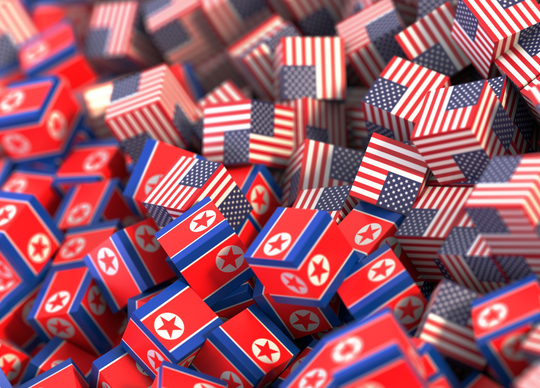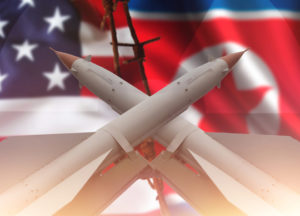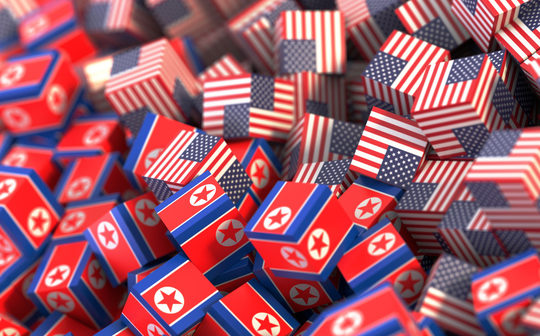
Written by Alan Cunningham.
In his book American Foreign Policy: The Dynamics of Choice in the 21st Century, Bruce W. Jentleson describes the three biggest challenges to nuclear disarmament within North Korea, these being, “…North Korean politics…[Kim Jong-un’s] first years in power were marked by a mix of provocations (including another weapons test in February 2013), internal power struggles, and some signs of possible openings…Second is China’s policy. China and the United States share interests in avoiding a major crisis that could escalate to war. But China also has interests in cooperative relations with North Korea. Third is U.S. policy. Debate continues over how “tough” to be and whether diplomacy can work”. This is quite a masterful overview of the challenges that North Korean denuclearization faces. Given the fact that the Biden administration will have to address this problem, examining the issue of North Korean denuclearization and how the Biden administration can address it is a must.
In her very recent and stellar biography of Kim Jong-un, The Great Successor, Anna Fifield devotes an entire chapter to North Korea’s long desire for a nuclear weapon. According to her, “Kim Il Sung [Kim Jong-Un’s grandfather and first leader of North Korea] had been thinking about getting nuclear weapons [from the earliest days of North Korea’s existence],” describing how the United States’ usage of the most destructive weapon in history to bring about an end to the War in the Pacific and due to the fear that the U.S., during the Korean War of 1951 to 1953, would use bombs against NK. A series of years after the conflict, Il Sung sent scientists to study in Russia before having his desires for a nuclear weapon again confirmed by the Cuban Missile Crisis (as well as developing a fear of his own benefactor for capitulating to the Americans). The desire, and seeming need, for such a weapon was further confirmed by the Chinese forming diplomatic relations with the Americans and the South Koreans secret pursuit of a nuclear weapon in addition to Il Sung’s “own mortality”. In the 1980’s and 90’s, North Korea signed non-proliferation treaties, yet were against allowing inspectors in and did not abide by the agreements. Finally, after an immensely long time, costing untold amounts of money, time, and (quite probably) the lives of ordinary North Koreans, the North Koreans were able to attain a successful detonation of a nuclear bomb (albeit, a small one) on 09 October 2006; from 2009 to 2017, five more tests were conducted, each being bigger than the last.
The desire for a nuclear weapon is not something that began with the rise of Kim Jong-il (Kim Jong-Un’s father) in 1994, but has been the almost fanatical yearning of three generations of one family. To me, a successful denuclearization program is not feasible with Kim Jong-un’s regime. He is finally fulfilling his grandfather’s dream of being a member of the H-bomb club and is bringing North Korea into a new paradigm, creating an establishment within NK and bringing about modernity while also strengthening the military might, capability, and power of the armed forces. In my mind, there is no way the current NK government under Kim Jong-un would submit to a nuclear deescalation or denuclearization program. Just recently as well, in December of 2019, the North Korean Ambassador to the United Nations, Kim Song, said, “We do not need to have lengthy talks with the US now and denuclearization is already gone out of the negotiating table,”. Kim Jong-un seemingly confirmed this sentiment in a public speech made to the North Korean Worker’s Party Central Committee at the beginning of 2020. Perhaps had Kim Jong-nam been made the new leader, North Korean denuclearization may have been possible and taken place or been in a better position to take place.
While it is not feasible that Jong-un will agree to denuclearization, it does not mean there are not still options available nor that those attempts should be disregarded and done away with.
In a War On The Rocks article by two Senior Fellows of the Nuclear Policy Program at the Carnegie Endowment for International Peace, they describe how the NK nuclear program is, “neither fully built nor highly reliable quite yet. It is also worth recalling the threat that North Korea could proliferate missiles or nuclear capabilities for profit or to create offshore production infrastructure…Washington needs a more realistic strategy…The primary U.S. negotiating objective should be a comprehensive freeze on those elements of the North Korean program that would greatly enhance its nuclear menace were they to be left unchecked. In effect, the aim would be to cap the North’s arsenal qualitatively and quantitatively, to stop it from becoming even more potent and destabilizing”.
 The researchers go on to emphasize that capping such capabilities as delivery vehicles and solid-fuel missiles would assist in hampering NK’s ability to create nuclear weapons and be able to properly deploy them. To go about doing this, the researchers say that having a multi-country (e.g. China, South Korea, Russia, and the EU) financial assistance package in return for denuclearization and a halt in cybercrime activities. This type of financial package must also be “reversible in case North Korea violates its obligations under the deal”. Basically, the fellows argue that capping as opposed to outright denuclearization or a rollback of nuclear weapons, is a tactic and strategy that can be taken when dealing with North Korea and their leaders, closing their article by noting, “The United States faces a nuclear-armed North Korea whose arsenal could soon target more American cities, with greater reliability, accuracy, and lethality. This is a looming threat that requires prevention…ultimately Kim Jong Un wants and needs the U.N. sanctions to be lifted and therefore has motive to negotiate. His December speech clearly left open this possibility. And if and when he chooses to re-engage, asking of him to freeze rather than give up his nuclear insurance policy is a more realistic path to capping the North Korean threat”.
The researchers go on to emphasize that capping such capabilities as delivery vehicles and solid-fuel missiles would assist in hampering NK’s ability to create nuclear weapons and be able to properly deploy them. To go about doing this, the researchers say that having a multi-country (e.g. China, South Korea, Russia, and the EU) financial assistance package in return for denuclearization and a halt in cybercrime activities. This type of financial package must also be “reversible in case North Korea violates its obligations under the deal”. Basically, the fellows argue that capping as opposed to outright denuclearization or a rollback of nuclear weapons, is a tactic and strategy that can be taken when dealing with North Korea and their leaders, closing their article by noting, “The United States faces a nuclear-armed North Korea whose arsenal could soon target more American cities, with greater reliability, accuracy, and lethality. This is a looming threat that requires prevention…ultimately Kim Jong Un wants and needs the U.N. sanctions to be lifted and therefore has motive to negotiate. His December speech clearly left open this possibility. And if and when he chooses to re-engage, asking of him to freeze rather than give up his nuclear insurance policy is a more realistic path to capping the North Korean threat”.
This type of measured stance against North Korea was not something that the Trump administration was willing to take or even consider.
This is evident in that, in February of 2019, at a second summit (in which Jong-un was brought due to “[his]confidence and the fact that he had a credible weapons program, together with the press of the sanctions”) in Beijing, “Trump had been willing to lifting sanctions, with a provision allowing them to be swiftly reimposed if North Korea resumed weapons testing…but the hardline national security advisor, John Bolton, and secretary of state Mike Pompeo apparently prevailed over their boss, talking him out of easing up on the North Koreans. The American president told his counterpart he needed to give up his entire nuclear program before any sanctions relief. This was essentially the same deal that US presidents had been trying to strike for decades…This approach had always failed. It had failed because it overlooked why North Korea had pursued nuclear weapons in the first place: the nuclear program is a means to defend North Korea against an American attack”. Obviously, a new way of dealing with North Korea is needed and, perhaps, with a new administration without so many hawks and one that looks at the history of a given foreign nation and all relevant intelligence on the ground and available to decision makers, a new way of dealing with North Korea and paving the path towards full denuclearization can be attained.
In a Biden administration, more of an emphasis on this tactic would be needed when dealing with China. Biden shared some of his North Korea strategy in January of 2020, when he “said he would not meet with North Korean leader Kim Jong Un…without “preconditions,” as President Donald Trump has done three times,” while enumerating, “the meetings had weakened crushing economic sanctions against the country that many experts believe brought Kim to the negotiating table in the first place…his approach to dealing with the North would include working to repair relations between South Korea and Japan to better combat any provocations while also heaping “enormous pressure” on China “because it’s also in their interest” to rein in Pyongyang’s nuclear activities”.
However, his administration was slow in formulating an NK policy. Some foreign policy experts pointed out that Biden had shared little on his policy before finally announcing his strategy before a joint session of Congress in May. Interestingly, Biden’s strategy somewhat slammed the Obama administration with Press Secretary Jen Psaki stating, “Our goal remains the complete denuclearization of the Korean Peninsula. With a clear understanding that the efforts of the past four administrations have not achieved this objective, our policy will not focus on achieving a grand bargain, nor will it rely on strategic patience” with the Council on Foreign Relations noting that the overall policy failed to work against the largest problem facing the U.S., “how to dissuade North Korea from pursuing unremitting nuclear development objectives to guarantee regime survival, stand equivalent to the U.S. as a nuclear power, and reshape the regional strategic environment in North Korea’s favor”.
Further into 2021, attempts by the United States to approach North Korea were rebuffed while others again pushed for what had previously been mentioned in the War On The Rocks article, a total review of sanctions against the Asian country on humanitarian grounds. Yet, the Biden administration appears to not be fully convinced of the viability of this strategy, continuing the path of past administrations.
Going in 2022, it is very apparent that the Biden administration must do more to counter North Korean aggression and halt their nuclear capability. By taking the advice of outside academics, foreign policy theorists, and Asian experts and adopting a policy of capping NK’s nuclear weapons and keeping them in check while working on the sanctions to alleviate those problems the Asian country is facing, would go a long way in better solving this key problem in Asia.
About the Author
Alan Cunningham is a graduate of Norwich University and the University of Texas. He aims to serve as an Officer in the U.S. Armed Forces beginning in 2022. He has been published in the Jurist, Security Magazine, and the U.S. Army War College’s War Room among others.






